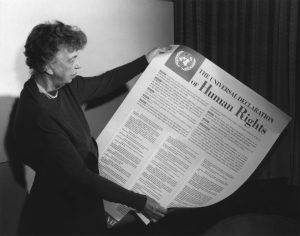Blasphemy a Capital Offense in Some Countries, Expunged in Others
- By Sam Field --
- 17 Jun 2020 --

By Andrew Lih CC BY-SA 3.0
In 1988 Salmon Rushdie published The Satanic Verses, a book which Muslims thought disparaged Islam. Riots broke out in Muslim countries, and shortly thereafter, Iran’s leader Ayatollah Khomeini issued a reward for the writer’s murder. Rushdie went into hiding, there were several assassination attempts and a translator of the book was murdered. The clash with Western ideas of freedom of speech and the press were striking. From the Western point of view, freedom of speech is a treasured right, and Iran should “just get over it.”
Then, in 2005, a Danish artist published some cartoons that made fun of Muhammad. All hell broke loose, with the cartoonist forced to go into hiding, and some 250 people killed in the resulting conflicts. The Danish constitution guarantees freedom of speech, as do most Western countries, but Muslims avoid depicting people, and Islamic art is primarily geometric and calligraphic. In addition, depicting Muhammad is seen as blasphemous, and to top it off, many Muslims thought the cartoons mocked Muhammad.
But it’s not just Muslim countries that have laws and penalties for blasphemy, defined as “Speaking badly about a religion, or insulting a god. …” More than seventy of the world’s countries have some kind of anti-blasphemy laws the worst of which are Iran Pakistan, Yemen, Somalia, Qatar, Egypt and Italy. Blasphemy can be punished with the death penalty in Saudi Arabia or Pakistan. In other countries, the punishment for the crime is a fine, or imprisonment.
Finland, for example, has laws that pertain to disturbing worship or publicly blaspheming against God or making inflammatory or disrespectful statements against what people consider sacred. And Germany – perhaps as a result of its Nazi past – has laws against blasphemy which is capable of disturbing the peace. And while rare, prosecutions do occur for some egregious offenses.
So what’s with Italy, a mostly Catholic Christian country, being labeled one of the worst punishers of blasphemy? In 2015 an Italian court fined an artist for depicting then-Pope Benedict having sex with an advisor – quite a bit different than a Pakistani ruling this year, in which a Christian man’s daughter had an affair with a Muslim, converted to Islam and married the man without her father’s knowledge. When the father found out, he became angry and said things against Islam and Muhammad, which his daughter recorded on her phone and turned over to the authorities, who sent him to prison for blasphemy.
And in another Pakistani case, three years ago a Christian man who shared allegedly anti-Islamic literature with a friend was sentenced to death for blasphemy.
Since Western countries have little truck with blasphemy laws, religions can be insulted at will, and God can be damned in everyday speech with no legal repercussions, so anti-religious people have little compunction about doing so, or getting facts straight when they do. Jews, Scientologists, Jehovah’s Witnesses and Latter-day Saints have been favorite targets of scurrilous attacks, which hasn’t slowed the expansion of those faiths, but have created public mistrust and unwillingness for people to look for themselves.
Not only do most Western nations have no blasphemy laws, but in the United States, large groups such as churches cannot sue for defamation, so detractors may say what they will without fear of consequences. Which goes to say that negative statements by individuals or groups about faith-based organizations cannot be taken at face value, and may be nothing more than opinion, disinformation or fabrication.
So while “death for blasphemy” can be seen as one extreme view, “no protection for faith-based groups” could be seen as an opposite extreme. In Western nations faith-based organizations have few defenses against lies, ridicule and misinformation except the good sense and the willingness of rational people to look for themselves.

By FDR Presidential Library & Museum
Perhaps the answer to some of these injustices – both brutal punishments for blasphemy and the unrestrained assaults on belief – are both to be found in the Universal Declaration of Human Rights which states in article 18: “Everyone has the right to freedom of thought, conscience and religion; this right includes freedom to change his religion or belief, and freedom, either alone or in community with others and in public or private, to manifest his religion or belief in teaching, practice, worship and observance.” Article 19 says: “Everyone has the right to freedom of opinion and expression; this right includes freedom to hold opinions without interference and to seek, receive and impart information and ideas through any media and regardless of frontiers.” And finally, Article 20 says: “Everyone has the right to freedom of peaceful assembly and association. No one may be compelled to belong to an association.”


















